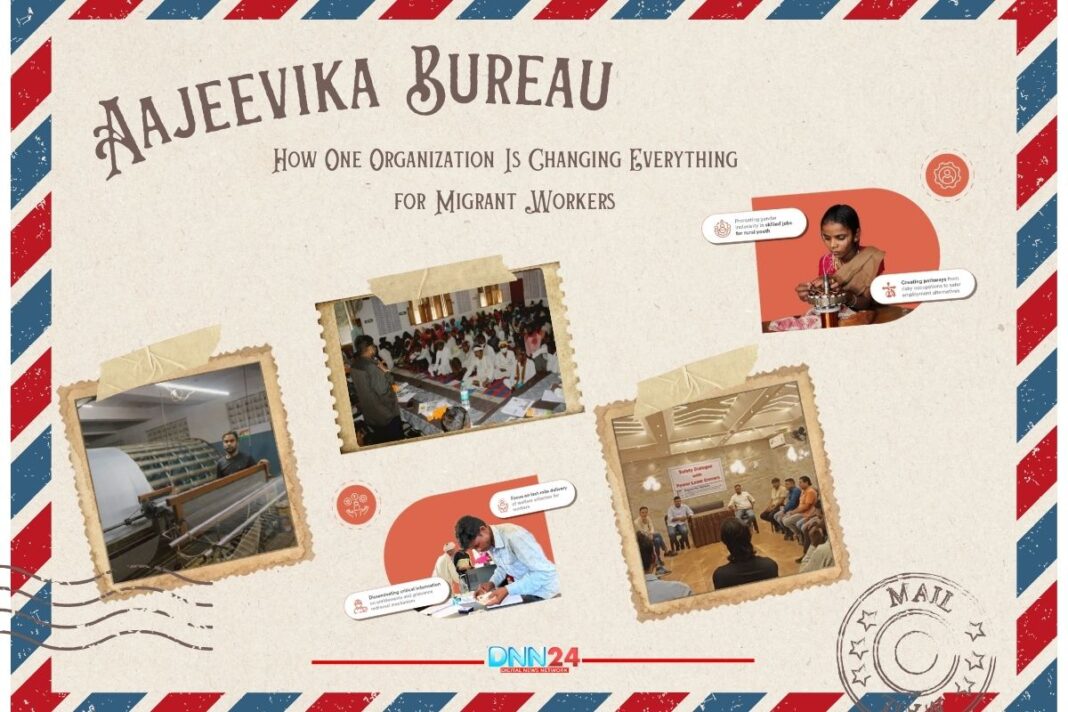In the quiet villages of south Rajasthan, where the Bhil, Garasiya, and Meena tribes wake each morning to the weight of poverty and vanishing opportunities, migration has long since ceased to be a choice. For these communities, leaving home to find work in distant cities has become as necessary as breathing. Aajeevika Bureau was born from this harsh truth in 2005, when Rajiv and Krishna recognized what most of India preferred to ignore: seasonal migration had become the survival strategy for millions of rural poor. These workers build the roads we drive on, construct the buildings we live in, and keep the wheels of urban India turning.
Yet their existence is marked by crushing wages, dangerous work sites, zero legal protection, and virtually no access to basic services. Aajeevika Bureau entered this brutal reality with a singular mission: to restore dignity to those whom society had rendered invisible. From the tribal heartlands of Rajasthan to the sprawling construction sites of Ahmedabad, Mumbai, and Pune, the organization began building something radical. This support system actually worked for the people who needed it most. This was not charity dressed up as development work. This was recognition that migrant workers deserved rights, respect, and a fighting chance at justice.
Living the Migration Story: From Concept to Reality
Aajeevika’s approach stands apart because the organization refuses to view migration from a comfortable distance. The founders understood a bitter paradox that defines modern India: the same workers who sustain our cities with their labor remain the most vulnerable and overlooked citizens. Through its network of “Shramik Sahayata evam Sandarbh Kendras,” or Workers Facilitation Centres, strategically located in both rural source areas and crowded urban destinations, Aajeevika created physical spaces where migrant workers could finally find help.
These centres offer legal aid when employers refuse to pay, skill training to increase earning potential, identity documentation that proves workers exist in the eyes of the state, and wage-recovery services that turn exploitation into accountability. Consider Ramesh’s story. After months of backbreaking labor on a construction site, his employer disappeared, leaving him unpaid. Alone in an unfamiliar city, without connections or knowledge of his rights, Ramesh faced the prospect of returning home empty-handed.
Then he found Aajeevika’s urban centre. With their support, he fought back and won his rightful wages. His story multiplied thousands of times across cities, industries, and workers. The centres transformed from simple service points into sanctuaries where migrant workers discovered their voices mattered, where they could form collectives, build solidarity, and negotiate for better wages and safer conditions. This shift from isolated vulnerability to collective strength became Aajeevika’s most powerful legacy.
Aajeevika Bureau:The Unheard Voices from the Migration Corridor
The migration corridor stretching from tribal Rajasthan to industrial Gujarat and Maharashtra holds countless stories that never reach public consciousness. Aajeevika’s emotional foundation rests on amplifying these unheard narratives. Take Rekha, a woman who refused to accept the limitations society placed on her. Through Aajeevika’s skill programs, she trained as a mason, shattering gender norms that said construction sites were for men only. She earned her livelihood with her own hands, supported her family, and proved that women could thrive in spaces traditionally denied to them. Her struggle against societal expectations and precarious work conditions reveals another dimension of migration: the extraordinary resilience of women who often carry the heaviest burdens while remaining the least visible.
But Aajeevika recognized that individual success stories, while inspiring, could not substitute for systemic change. The organization evolved beyond providing aid to building a movement for dignity. This meant empowering entire migrant communities, advocating for policy reforms at the state and national levels, and creating institutions that finally recognized migrant workers’ rights and contributions to the economy. The transformation required patience, persistence, and an unwavering belief that justice delayed was not justice denied but justice that demanded louder voices and stronger solidarity.
Aajeevika Bureau: Building a Movement Against Skepticism and Doubt
Behind Aajeevika Bureau’s achievements lie deeply human stories of survival, struggle, and hard-won empowerment. The early years tested the founders’ resolve as skepticism came from unexpected quarters. Many NGOs and development professionals doubted the approach, fearing that supporting migration would encourage people to leave their villages rather than develop rural areas. Some accused Aajeevika of facilitating exploitation instead of preventing it. But founders like Sanjay, who carried personal experience of migration’s brutal challenges, refused to back down.
They argued forcefully that migration was already happening, that it represented a rational strategy for survival, not a problem to be wished away. The real question was whether migrant workers would face this reality alone and unprotected, or whether they would find support, rights, and dignity along the way. This shift in mindset, from viewing migration as a failure of development to recognizing it as a legitimate livelihood strategy requiring protection and social security, took years of grassroots work, rigorous research, and constant advocacy.
Slowly, the skeptics became believers. Government officials started listening. Academics began studying their model. Other organizations reached out to learn and replicate their approach. Aajeevika’s persistence made it a pioneer whose ideas on migrant worker rights influenced policy discussions and inspired similar initiatives across India.
Aajeevika Bureau: A Blueprint for Justice in the Informal Economy
Aajeevika Bureau’s journey reveals something profound about the nature of social change in India. Migration, despite its hardships, can become a pathway to dignity and justice when workers receive proper support and protection. The organization’s success rests on its refusal to choose between competing approaches. Instead, it built a comprehensive model: strong worker collectives that amplified individual voices, targeted services addressing immediate needs, and strategic partnerships with government agencies, academic institutions, and labor movements that expanded reach and influence.
This multi-pronged strategy offers a blueprint for creating equitable work conditions throughout India’s vast informal economy, where most workers operate without contracts, benefits, or legal recourse. For the millions caught in the fragile web of seasonal migration, leaving home for months, enduring separation from family, facing exploitation and hardship in unfamiliar cities, then returning to villages with barely enough to survive until the next cycle begins, Aajeevika represents something more than an organization.
It is a beacon of hope cutting through the darkness of invisibility. It illuminates lives once pushed to society’s margins with the promise that respect, security, and human rights need not remain distant dreams but can become lived reality, one worker, one collective, one victory at a time.
Also Read: Truly Tribal: Hidden Village Art Revolution That’s Quietly Changing India
You can connect with DNN24 on Facebook, Twitter, and Instagram and subscribe to our YouTube channel.



